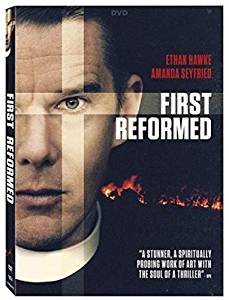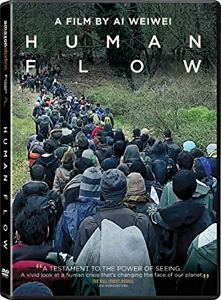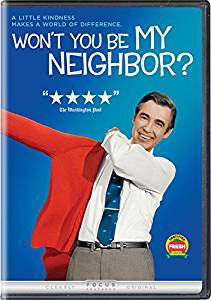For Sunday December 30, 2018
Lectionary Readings (Revised Common Lectionary, Year C)
Psalm 148
Colossians 3:12-17
Luke 2:41-52
This is a fun time of year for me. In the essays for the next two weeks I reflect on the films and books that I reviewed for Journey with Jesus in this past year and identify my favorites. Of course, there's no accounting for personal taste, but here are my top picks for 2018.
In his book Sculpting in Time (1986), the Russian filmmaker Andrei Tarkovsky says that "the allotted function of art is not, as is often assumed, to put across ideas, to propagate thoughts, to serve as an example. The aim of art is to prepare a person for death, to plough and harrow his soul, rendering it capable of turning to good."
These five films "ploughed my soul," and, I pray, "rendered it capable of turning to good."
And don't forget — you can search JwJ's nearly 800 film reviews from 106 countries by title or by country. Just use the drop down menu under "Film" at the top of any page.
Chasing Trane: The John Coltrane Documentary (2016)
This ninety-minute documentary about the jazz saxophonist John Coltrane (1926–1967) tells the inspirational story of one of the greatest musical geniuses of his generation. Coltrane's story begins in Hamlet, North Carolina, where both of his grandfathers were pastors. That historically racist context and deeply spiritual family combined to find expression in Coltrane's jazz, which was nothing more and nothing less than a musical medium in search of what is eternally good, true, and beautiful. One of the special treats of this movie is how it explores Coltrane's pronounced spirituality. To take just one example, from the cover of his famous album A Love Supreme, Coltrane wrote, "May we never forget that in the sunshine of our lives, through the storm and after the rain — it is all with God — in all ways and forever. ALL PRAISE TO GOD." Coltrane's story is told by the memories and reflections of many people, against the background sound track of his music: family, friends, band mates, and music critics. My favorites were Carlos Santana, the Princeton philosopher Cornell West, Wynton Marsalis, Bill Clinton, and John Densmore (the drummer for the Doors). Coltrane died all too soon at the age of forty from liver cancer.
 |
First Reformed (2018)
The Protestant pastor Ernst Toller (played by Ethan Hawke) is keeping a journal of his dark thoughts, much like the young priest in the novel Diary of a Country Priest by Bernanos. As the movie unfolds, and a voice over reads the journal entries back to us, you understand why. This is a minister in the midst of a spiritual crisis, for many, good reasons. Those who are familiar with the personal background of the director Paul Schrader (Taxi Driver, Raging Bull, The Last Temptation of Christ) will view this movie as deeply autobiographical. In a panel discussion after a screening of First Reformed, Schrader admitted that he keeps returning to versions of his most famous character, the estranged outsider Travis Bickle in the 1976 classic Taxi Driver, and that Toller is another iteration of Bickle, who once confessed: "Loneliness has followed me my whole life — everywhere — in bars, in cars, sidewalks, stores - everywhere. There's no escape. I'm God's lonely man." This is Schrader's 12th film, and many critics are praising it as the culmination of his remarkable 40-year career.
 |
Human Flow (2018)
In July of 2015, after four years of house arrest in his native China, the dissident artist Ai Weiwei finally got his passport back. He immediately moved to Berlin as a refugee in exile. He thus brings his personal experience to the signature crisis of our age, namely, the 65 million refugees all around the world who have been forcibly removed from their homes. This documentary film is an excellent example of how sometimes images are far more powerful than words. There's very little narration, except for the intermittent facts, figures, and interviews with experts from places like Human Rights Watch and the UNHCR. To make the film, Weiwei gathered a team of 200 people that filmed in 23 countries. There's Lebanon, where a third of the population are refugees. Thirty million stateless Kurds. Over a million Syrians in Jordan, which would be the rough equivalent of sixty million refugees in the United States. But these are people, and not just numbers, and Weiwei lets his camera linger long on their faces and their stories, so that it becomes impossible to turn away from our fellow human beings. In 1989, when the Berlin Wall fell, there were 11 countries in the world with border walls and fences; today there are 70 such countries. And the last stop in this film? The Mexican — USA border, where a border patrol ludicrously shows the director where he can and can't film "for thirty minutes." I watched this film on Amazon Prime.
Paterson (2016)
The independent film maker Jim Jarmusch continues his trademark slow-moving minimalism in this story about the simple and the sacred. The movie is set in Paterson, NJ. Its main protagonist is a bus driver named Paterson, who drives the "#23 Paterson" bus. On the one hand, this film is about the sacred ordinary. The story follows one week in the life of Paterson the bus driver. Each new day is a near carbon copy of the day before, right down to much of the dialogue and actions. He gets up, eats a bowl of Cheerios, walks to work in his blue bus uniform with his green lunch pail, then walks back home, straightens the wobbly mailbox in his weed-infested yard, eats dinner, and walks his dog Marvin to the local bar. His wife Laura sells home made cupcakes at the farmers market and splurged on a $200 guitar. They are unfailingly tender, polite, and kind to each other. I don't think there's one moment of special effects, sex, violence, drugs, or vulgarity in this film. On the other hand, you could say this film is also about the ordinary sacred, for at night, Paterson writes poetry. Throughout the film a voice-over features his poems. We also learn that William Carlos Williams was a Paterson native, who similarly had a "regular" job (as a physician). Paterson never speaks to his riders, but he eavesdrops on their conversations as a careful listener and keen observer of their humanity that he encounters every day. Perhaps that's because he doesn't even own a cell phone. I watched this film on Amazon Streaming.
 |
Won't You Be My Neighbor (2018)
This documentary movie about Fred Rogers (1928–2003) and his television show for pre-school children called "Mr. Rogers' Neighborhood" (895 episodes from 1968–2001) has received uniformly rave reviews. In our age of violence and vulgarity, it is a shocking commentary on personal and civic kindness. Like many people in the theater, my wife and I just wept at times as we watched this ordained Presbyterian minister fulfill what he understood to be a sacred calling in an otherwise media wasteland. One of Rogers' sons noted that "for a man who spent his whole life in television, my dad really hated most of what was on TV. He thought it was horribly degrading for children." So, it was an unlikely medium for a powerful message: that, as Rogers said, "love is the root of everything." Margaret Whitmer, one of the producers of the show observed how, “if you take all of the elements that make good television and do the exact opposite, you have ‘Mister Rogers' Neighborhood’. Low production values, simple set, an unlikely star. Yet, it worked.” Indeed it did, and for his efforts Rogers was awarded the Presidential Medal of Freedom, along with numerous other awards.





